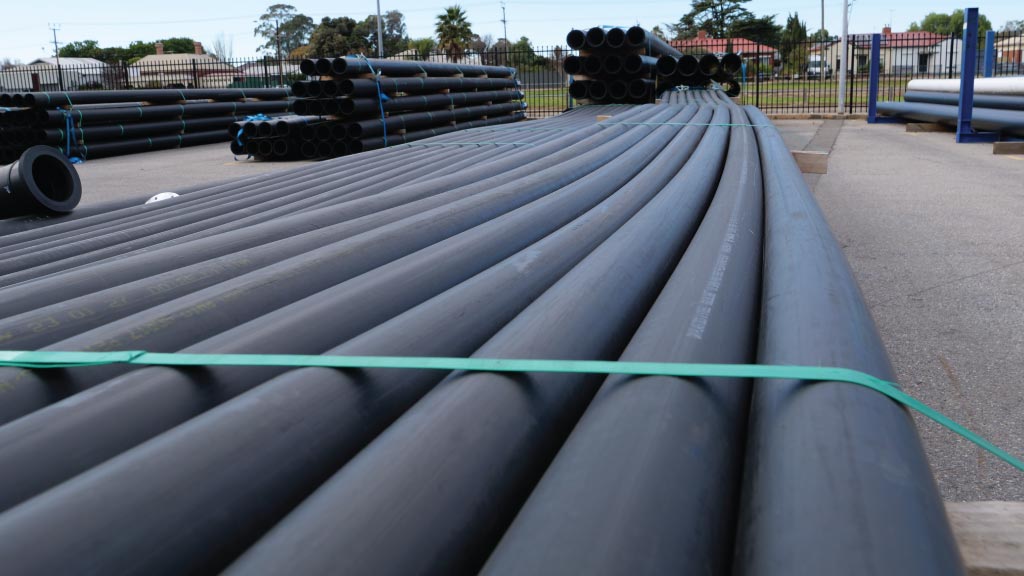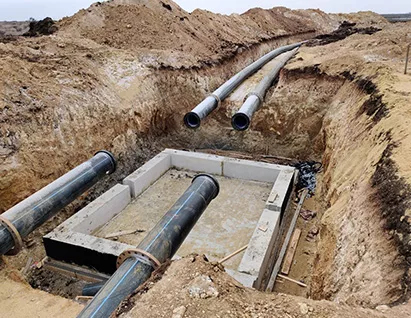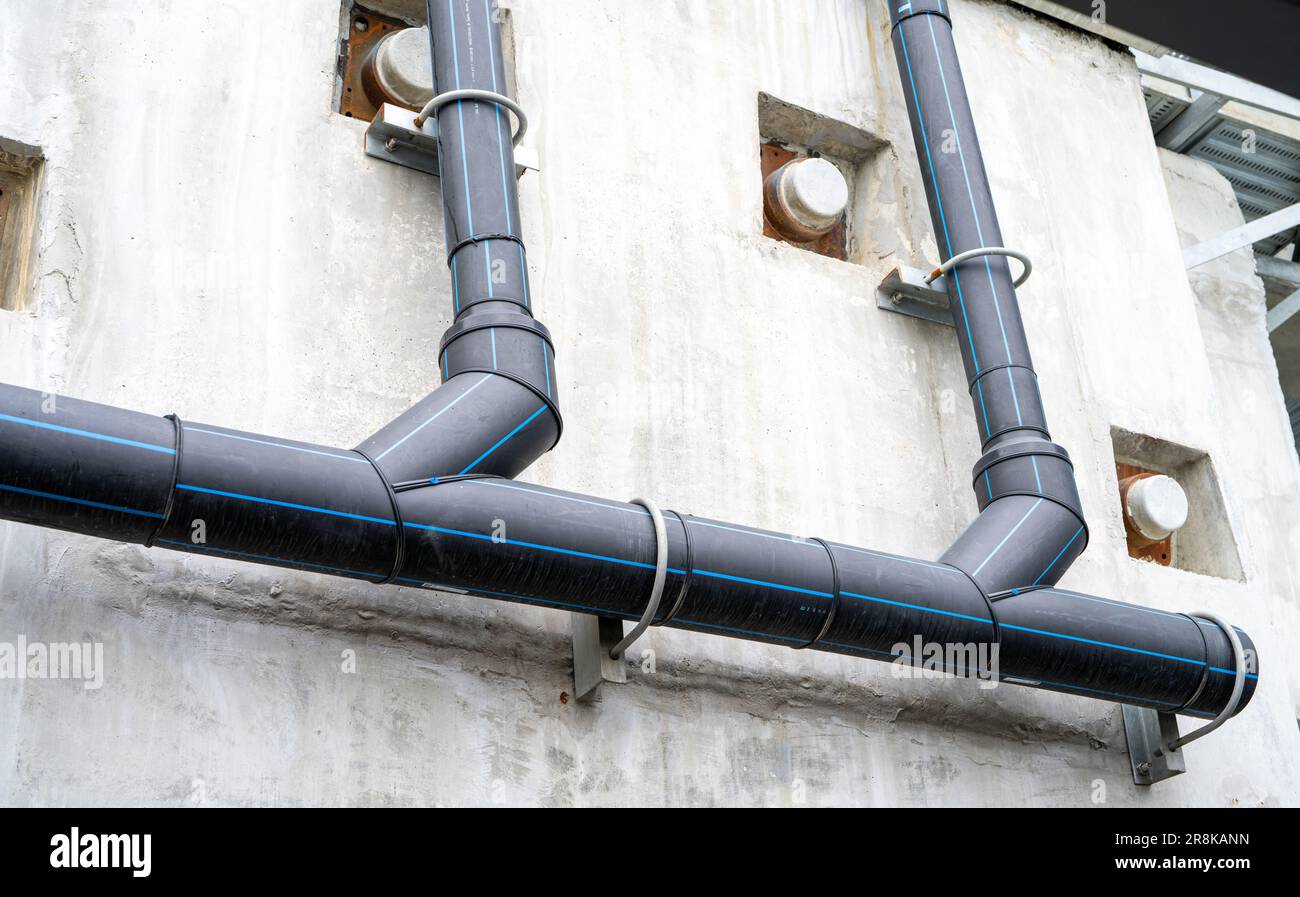Pipeline Manufacturer Spotlight: Discover the most effective in the Market for Your Next Task
In the domain of pipeline manufacturing, the selection of maker can considerably influence the result of your project. With a selection of companies providing sophisticated products and ingenious remedies, comprehending the key requirements for option ends up being important. Sector leaders like Tenaris, Vallourec, and U.S. Steel go to the forefront of offering reliable and lasting alternatives. The question stays: what details factors should assist your decision-making procedure, and just how do these producers distinguish themselves in a significantly affordable market? Exploring these elements may expose understandings that can influence your next project's success.
Market Introduction
In the pipeline manufacturing field, there exists a vibrant interplay of technological developments and regulative demands that forms sector practices. This sector is vital for the transport of oil, gas, water, and various other liquids, necessitating a robust understanding of both material residential or commercial properties and environmental effects. Manufacturers are progressively integrating innovative products and cutting-edge production strategies to boost the durability and performance of pipes, ensuring they can hold up against varying pressures and ecological problems.

Furthermore, the rise of electronic innovations has changed standard manufacturing procedures, permitting boosted monitoring and anticipating upkeep. This shift not only boosts operational performance but likewise aids in reducing prospective failings before they intensify right into critical problems. On the whole, the landscape of pipeline manufacturing is characterized by a constant advancement driven by innovation and compliance, placing the field for future growth and sustainability.
Key Requirements for Option
Picking the best pipeline maker entails careful consideration of a number of crucial standards that assure reliability, performance, and conformity with market criteria. Assess the producer's experience and track record within the market. A reputable business with a tested performance history is most likely to supply high-grade product or services.
Next off, review the series of materials and specifications supplied. Manufacturers need to provide a variety of options that accommodate diverse task needs, including different pipeline dimensions, products, and coating systems. Compliance with relevant industry standards, such as ASTM or API, is vital, as it assures the items fulfill safety and security and efficiency standards.
In addition, consider the producer's technological capacities. Advanced manufacturing techniques and quality control measures can significantly impact the durability and efficiency of the pipelines. Customer care and support are additionally essential; a knowledgeable and receptive team can promote smoother job execution and resolve any type of concerns immediately.
Examine prices structures and lead times. While cost-effectiveness is crucial, it ought to not endanger high quality. Stabilizing these criteria will certainly lead to an educated decision that lines up with task goals and governing requirements.
Leading Pipeline Manufacturers
In the competitive landscape of pipeline manufacturing, a number of sector leaders stand apart for their cutting-edge innovations and dedication to sustainability. These top manufacturers not just master providing high-quality products however additionally prioritize ecologically liable practices in their operations. An introduction of their payments provides important understandings right into the future of pipeline solutions.
Market Leaders Introduction
Just how do industry leaders shape the pipeline manufacturing landscape? The top pipeline suppliers play an important function in developing sector standards, driving development, and ensuring quality control throughout the supply chain. Firms such as Tenaris, Vallourec, and U.S. Steel have set criteria for sustainability, efficiency, and safety, affecting not simply their procedures yet additionally their rivals.
These leaders spend considerably in research and development to enhance product toughness and performance. Their dedication to sticking to regulative compliance and worldwide requirements fosters consumer trust and encourages industry-wide fostering of ideal techniques. They usually work together with stakeholders, including engineers and building and construction companies, to ensure that their products fulfill certain job requirements and environmental factors to consider.
Market leaders likewise prioritize consumer connections, providing tailored services and outstanding service, which enhances their market placement. By leveraging economic climates of range, they can provide competitive rates without jeopardizing top quality. Eventually, the influence of these makers extends past their products; they form the future of pipeline innovation and manufacturing procedures, ensuring a resilient and lasting infrastructure for numerous industries worldwide.
Cutting-edge Technologies Provided
What cutting-edge innovations are changing the pipeline manufacturing market? Recently, top pipeline suppliers have welcomed advanced modern technologies to enhance effectiveness, reliability, and security in their procedures. One significant growth is the combination of smart pipeline tracking systems, making use of Internet of Things (IoT) sensors. These systems give real-time data on pipeline conditions, allowing aggressive maintenance and minimizing the threat of leaks or failures.
In addition, manufacturers are progressively taking on innovative products, such as composite pipes, which provide improved resilience and resistance to rust. These products not just extend the lifespan of pipelines however likewise minimize functional prices with time. Furthermore, additive manufacturing, or 3D printing, is changing the manufacturing procedure. This technology permits fast prototyping and personalization of elements, enhancing supply chains and minimizing waste.
Fabricated knowledge (AI) and artificial intelligence algorithms are also gaining traction, maximizing layout procedures and anticipating upkeep routines. By analyzing large datasets, these technologies assist recognize potential concerns prior to they develop, improving security and operational efficiency. As these cutting-edge modern technologies proceed to progress, they promise to form the future of pipeline manufacturing, making certain that tasks can be completed on schedule and within budget while keeping miraculous security standards.
Sustainability Practices Highlighted
The recurring improvements in ingenious technologies within the pipeline manufacturing sector are matched by a growing focus on sustainability methods amongst leading producers. These firms are progressively adopting eco-friendly approaches, minimizing waste, and minimizing their carbon impacts throughout the production procedure.
Leading producers are focusing on the use of recycled products, improving the lifecycle of their products. By carrying out closed-loop systems, they efficiently make use of resources, thereby reducing the environmental influence related to raw material removal and processing. In addition, numerous organizations are buying eco-friendly energy sources to power their procedures, further minimizing greenhouse gas exhausts.
Furthermore, pipeline suppliers are embracing sophisticated coatings and materials that boost corrosion resistance and durability, which inevitably decreases the frequency of substitutes and fixings. These sustainable methods not just add to environmental stewardship but likewise straighten with the growing regulatory demands and market expectations for accountable manufacturing.
Partnership with stakeholders to promote sustainability efforts showcases a dedication to a greener future. By concentrating on lasting methods, leading pipeline makers are not just improving their functional effectiveness however likewise setting a criteria for market standards, promoting a more sustainable pipeline infrastructure for all.
Innovative Technologies
The pipeline industry is witnessing a transformative change via the assimilation of ingenious modern technologies, specifically in sophisticated products advancement and wise pipeline monitoring systems. These developments not only boost the resilience and efficiency of pipes yet additionally enhance security and environmental stewardship. As producers embrace these advanced services, the future of pipeline infrastructure looks significantly encouraging.
Advanced Products Advancement
Developments in advanced products growth are revolutionizing the pipeline manufacturing market, driving improvements in longevity, effectiveness, and performance. The appearance of high-strength alloys and composite products has actually enabled the manufacturing of pipes that can hold up against extreme problems, including high stress and destructive environments. These products not only extend the life-span of pipelines yet also lower maintenance prices, inevitably resulting in enhanced functional performance.

Improvements in polymer scientific research have actually led to the creation of lightweight, flexible piping systems that are simpler to transport and install. These developments add to decrease carbon impacts in pipeline projects, aligning with global sustainability goals. On top of that, the combination of nanotechnology in material advancement is opening up brand-new methods for boosting the mechanical buildings of traditional materials, causing pipelines that can sustain better stress while maintaining honesty.
As manufacturers proceed to spend in study and growth, the pipeline sector is witnessing an unmatched development in material capabilities. This focus on advanced products not only supports the expanding demand for reliable framework yet likewise fosters an affordable landscape in which business can distinguish themselves through superior item offerings. The future of pipeline manufacturing is definitely intertwined with these groundbreaking advancements.
Smart Pipeline Monitoring Equipments
Smart pipeline surveillance systems are transforming the landscape of pipeline management by incorporating innovative innovations such as IoT sensing units, fabricated intelligence, and real-time information analytics. HDPE Pipe Supplier. These systems enable drivers to keep track of the integrity and efficiency of pipelines constantly, noticeably decreasing the threat of failures and leakages
Through the release of IoT sensors along pipeline courses, operators gather essential information on temperature, stress, and circulation rates. This information is sent in real-time to centralized tracking systems, enabling instant evaluation and response to anomalies. Advanced fabricated knowledge algorithms examine this information to recognize patterns, predict prospective concerns, and advise preventative steps prior to they rise right into costly issues.
The application of clever monitoring systems not only improves functional performance yet also fosters compliance with regulative requirements. By giving detailed reports and insights, these technologies support much better decision-making and danger monitoring. In addition, the assimilation of equipment learning capabilities enables systems to enhance gradually, adjusting to altering conditions and improving predictive accuracy.
As the market continues to embrace these advancements, wise pipeline tracking systems are positioned to play an essential function in guaranteeing the security, dependability, and sustainability of pipeline facilities. Pipeline Manufacturer.

Study of Success
Success tales within the pipeline manufacturing market illuminate the performance of ingenious solutions and partnership among stakeholders. One remarkable situation is the collaboration between a leading supplier and an oil business to implement a modern smart pipeline surveillance system. The job substantially decreased leakage detection times and boosted operational performance, showcasing the value of innovative technology in improving safety and minimizing prices.
One more instance involves a maker that successfully integrated lasting materials into their pipeline building and construction. By collaborating with research study establishments, they developed a composite product that is not just durable however additionally eco-friendly. This technology not only satisfied regulative needs but likewise brought in brand-new clients seeking sustainable options.
A pipeline project in a difficult geographical area showed the significance of adaptive design strategies. The manufacturer collaborated with regional designers to create a pipeline that could stand up to severe weather, inevitably preventing service disruptions and ensuring reliability for end-users.
These case research studies exemplify how calculated collaborations, technical innovations, and flexible options in the pipeline manufacturing market cause effective job results, thus reinforcing the industry's dedication to supplying high-quality framework while resolving customer needs effectively.
Sustainability Practices
As the pipeline manufacturing market develops, the assimilation of sustainability methods has come to be increasingly essential. Manufacturers are taking on eco-friendly materials and procedures to decrease their environmental impact while keeping high requirements of high quality and security. This change is driven by both regulative requirements and an expanding awareness of ecological duty among stakeholders.
One noticeable method is the usage of recycled materials in pipeline manufacturing, which decreases the need for virgin resources and reduces waste. Firms are also spending in energy-efficient manufacturing techniques, thus decreasing their carbon footprint during manufacturing. Additionally, lots of manufacturers have actually embraced water preservation techniques, making sure that water use is reduced and wastewater is treated effectively.
Furthermore, sustainable transport methods are being made use of to supply products, including optimizing logistics to decrease emissions. The commitment to lifecycle evaluations enables suppliers to evaluate the environmental impact of their products from creation to disposal, advertising not just sustainability however additionally lasting financial viability.
Ultimately, the adoption of sustainability practices in pipeline manufacturing represents an important step toward lining up market operations with global environmental goals, guaranteeing that future jobs are both ingenious and accountable - American Plastics LLC HDPE Pipeline Manufacturer. - HDPE Pipe Supplier
Future Trends in Pipeline Manufacturing
What advancements are on the horizon for pipeline manufacturing? As the market progresses, a number of crucial patterns are forming the future of pipeline manufacturing. Initially, the combination of sophisticated materials such as composite pipes guarantees improved toughness and resistance to deterioration, therefore visit this site expanding the life expectancy of pipelines. These products not only lower maintenance expenses however additionally improve safety criteria.

Sustainability continues to be an essential emphasis, with producers significantly prioritizing green practices. The advancement of eco-friendly products and the implementation of recycling programs are obtaining grip, aligning with worldwide environmental objectives.
Regularly Asked Inquiries
What Materials Are Typically Utilized in Pipeline Manufacturing?
Typical products made use of in pipeline manufacturing consist of carbon steel, stainless steel, polyethylene, and ductile iron (American Plastics LLC HDPE Pipeline Manufacturer). Each material supplies distinctive advantages relating to toughness, corrosion resistance, and suitability for different applications within the pipeline sector
The length of time Does the Pipeline Manufacturing Process Usually Take?
The pipeline manufacturing procedure typically ranges from a few weeks to a number of months, depending upon aspects such as product option, manufacturing ability, and customization requirements. Efficient planning and sychronisation can considerably affect the general timeline.
What Are one of the most Usual Pipeline Sizes Available?
One of the most usual pipeline dimensions vary from 2 inches to 48 inches in size. Irregularity exists based on certain applications, market requirements, and regional demands, guaranteeing versatility to satisfy diverse project demands and functional demands.
Exist Service Warranties Supplied on Pipeline Products?
Yes, several pipeline makers use guarantees on their products, usually covering material defects and handiwork. The period and regards to these guarantees vary by producer, so it is necessary to review specific plans prior to purchase.
How Do I Ensure Correct Setup of Pipelines?
To guarantee proper installment of pipelines, follow sector requirements, utilize certified experts, carry out detailed site analyses, carry out quality assurance actions, and safe compliance with laws. Routine inspections and upkeep further boost pipeline performance and long life.
Pipeline producers are welcoming sophisticated coatings and products that improve deterioration resistance and longevity, which eventually decreases the regularity of substitutes and repair services. The pipeline sector is seeing a transformative change with the integration of innovative modern technologies, especially in innovative materials advancement and smart pipeline tracking systems. As suppliers continue to spend in study and development, the pipeline market is observing an unmatched advancement in material abilities. Smart pipeline surveillance systems are changing the landscape of pipeline management by integrating sophisticated technologies such as IoT sensors, man-made knowledge, and real-time information analytics. Yes, numerous pipeline makers supply warranties on their products, usually covering product issues and workmanship.